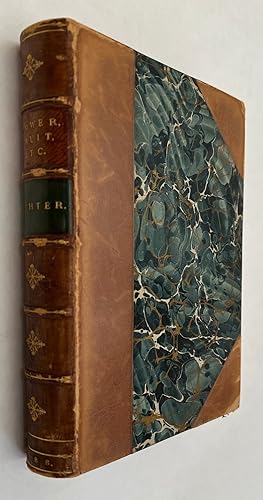richter jean paul ewing alexander (1 risultati)
Tipo di articolo
- Tutti gli articoli
- Libri (1)
- Riviste e Giornali
- Fumetti
- Spartiti
- Arte, Stampe e Poster
- Fotografie
- Mappe
-
Manoscritti e
Collezionismo cartaceo
Condizioni
- Tutte
- Nuovi
- Antichi o usati
Legatura
- Tutte
- Rilegato
- Brossura
Ulteriori caratteristiche
- Prima edizione
- Copia autografata
- Sovraccoperta
- Con foto
- No print on demand
Paese del venditore
Valutazione venditore
-
Flower, Fruit, and Thorn Pieces, Or, the Wedded Life, Death, and Marriage of Firmian Stanislaus Siebenkaes: Parish Advocate in the Burgh of Kuhschnappel. (A Genuine Thorn Piece) Uniform English; By Jean Paul Friedrich Richter. Translated from the German by Alexander Ewing
Editore: George Bell and Sons, London, 1888
Da: BIBLIOPE by Calvello Books, Oakland, CA, U.S.A.
Hardcover. Condizione: Very good. Large octavo in half leather and marbled boards; xv, 565, [1] pages 19 cm. Handsome leather binding. Marbled end papers. English translation of the German original: Blumen-, Frucht- Und Dornenstücke. "Jean Paul occupies an unusual position in German literature and has always divided the literary public. Some hold him in highest veneration while others treat his work with indifference. He took the Romantic formlessness of the novel to extremes: Schlegel called his novels soliloquies, in which he makes his readers take part (in this respect going even further than Laurence Sterne in Tristram Shandy). Jean Paul habitually played with a multitude of droll and bizarre ideas: his work is characterized by wild metaphors as well as by digressive and partly labyrinthine plots. He mixed contemplation with literary theory: alongside spirited irony the reader finds bitter satire and mild humour; next to soberly realistic passages there are romanticized and often ironically curtailed idylls, social commentary and political statements. The quick changes of mood attracted the composer Schumann whose Papillons was inspired by Jean Paul. His novels were especially admired by women. This was due to the empathy with which Jean Paul created the female characters in his works: never before in German literature were women represented with such psychological depth. At the same time however, his work contains misogynistic quips. Jean Paul's character may have been as diverse and as confusing as many of his novels: he was said to be very sociable and witty, while at the same time extremely sentimental: having an almost childlike nature, quickly moved to tears. It is obvious from his works that his interests encompassed not only literature but also astronomy and other sciences. Paul's relationship with the Weimar classicists Goethe and Schiller always remained ambivalent: Schiller once remarked that Jean Paul was as alien to him as someone who fell from the Moon, and that he might have been worthy of admiration "if he had made as good use of his riches as other men made of their poverty." Herder and Wieland on the other hand fully appreciated his work and supported him. Although he always kept his distance from the classicists, who wanted to "absolutize" art, and although his theoretical approach (most notably in his Introduction to Aesthetics) was considerably influenced by Romanticism, it would be misleading to call him a Romantic without qualification. Here too he kept his distance: with all his subjectivism he didn't absolutize the subject of the author as the Romantics often did. Jean Paul had what had become rare amidst classical severity and romantic irony: humour. He also was one of the first who approached humour from a theoretical standpoint. He thought that both the Enlightenment and metaphysics had failed, though they still held importance for his worldview. He arrived at a philosophy without illusions, and a state of humorous resignation. Correspondingly he was one of the first defenders of Schopenhauer's philosophy. He didn't try to indoctrinate but to portray human happiness, even (and especially) in an increasingly alienated environment - the rococo castles and bleak villages of Upper Franconia. Jean Paul was not only the first to use and name the literary motif of the Doppelgänger, he also utilised it in countless variations (e.g. Siebenkäs and Leibgeber, Liane and Idoine, Roquairol and Albano). In his novel Siebenkäs he defines the Doppelgänger as the "people who see themselves." Jean Paul was a lifelong defender of freedom of the press and his campaigns against censorship went beyond many of his contemporaries. In his Freiheitsbüchlein (1805), he maintains that books belong to humanity and should have the chance to have an impact on all times, not just the present moment, and therefore preventing a book from being published renders the censor a judge not just for contemporary society but for all future societies. Censorship is not feasible because it would be impossible to find a person able to fulfill the true requirements of the office. After the great achievements of the eighteenth century, the prospect of complete freedom of opinion, speech, and printing was real. Even under the tightened conditions of the Napoleonic occupation, Jean Paul continued to speak out in favor of reason, as in his Friedens-Predigt an Deutschland (1808). The last section of his Politische Fastenpredigten (1816) contains a warning to rulers that minds cannot be controlled, and that police action will only cause them to eventually explode like a champagne bottle."- Wikipedia. Attractive personal bookplate to front past down(of the period). Nominal external wear. Very good. Tight and clean.


